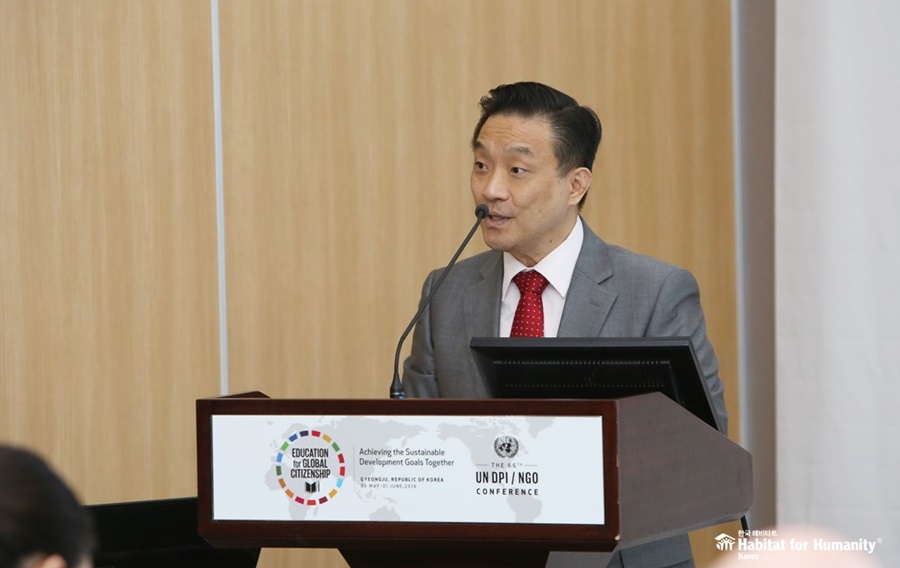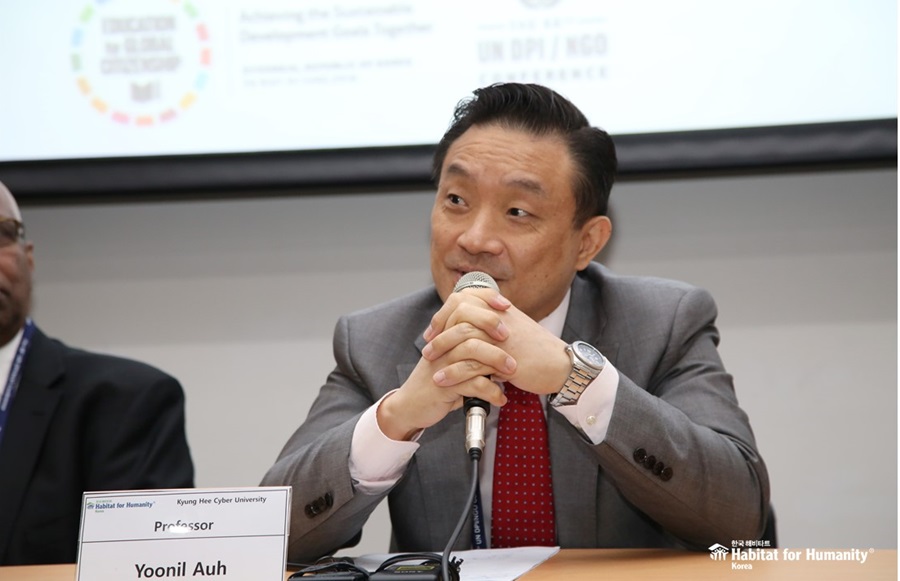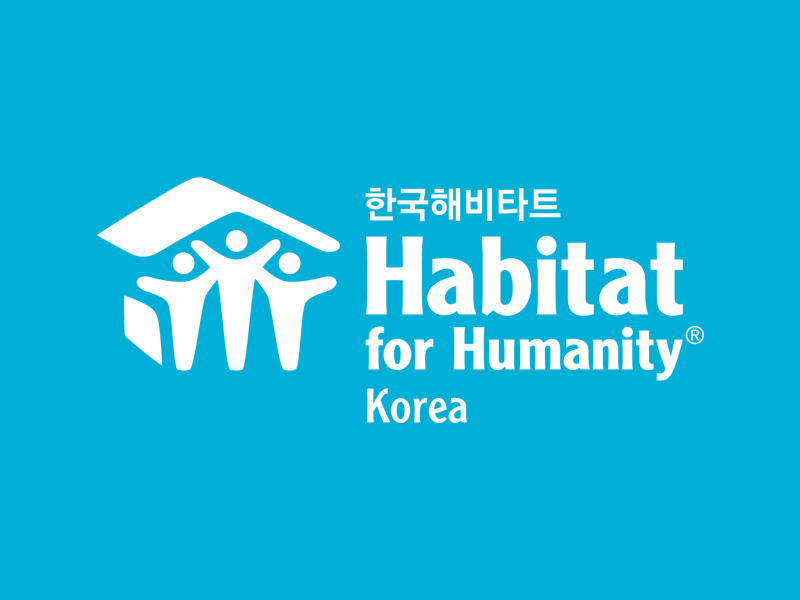인터뷰
해비타트와 함께한 이들의 후기 인터뷰, 지금 만나보세요.“온라인교육, SDG‘s 달성의 근간이 될 것” - 경희사이버대학교 어윤일 교수 인터뷰
- 작성일2016/06/23 18:30
- 조회 3,721
“온라인 플랫폼을 활용한 교육이 SDG‘s 달성의 근간이 될 것”
“Education utilizing online platform will be the foundation for the achievement of SDGs”
The 66th UN NGO Conference – Interview with Yoonil Auh, Professor of Kyunghee Cyber University
제66차 UN NGO 컨퍼런스 ‘세계시민교육-유엔지속가능개발목표 이행을 위한 협력(Achieving the Sustainable Development Goals Together)을 주제로 한국해비타트가 펼친 ‘SDG 11: 도시슬럼 개선과 교육’ 워크숍이 계속됐다. SDGs 11번째 목표 ‘회복력 있고 지속 가능한 도시와 거주지 조성’과 4번째 세부목표 ‘세계시민교육’을 접목하고자 경희사이버대학교 어윤일 교수가 두 번째 연사로 나섰다.
On May 30, UN held the 66th UN NGO Conference at Gyeongju Hwabaek International Convention Center. The topic of the conference was “Global Citizenship Education– Achieving the Sustainable Development Goals Together.”. The conference was designated to sympathize with the importance of quality education, the 4th goal regarding the achievement of SDGs and to discuss the NGOs’ contribution to the accomplishment of quality education.
Regarding this, on the second day of the conference, Habitat Korea had a workshop on the topic of ‘Improvement of urban slum and education’ on the second day of the conference. Habitat Korea brought people from all walks of life who graft the 11th goal of SDGs, ‘’ and the 4th particular object ‘Global Citizenship education’.

그는 “포용적이고 지속가능한 도시를 위한 Massive Open Learning-Community (MOLC)”라는 주제로 온라인 플랫폼을 활용한 교육이 지속가능한 커뮤니티 활성화에 큰 역할을 할 것이라고 전했다. 어떻게 온라인 플랫폼을 활용한 교육이 포용적이고 지속가능한 사회를 만들 수 있을까? 어 교수와의 인터뷰를 통해 좀 더 자세한 이야기를 들었다.
Yoonil Auh, Professor of Kyunghee Cyber University, who spoke for the second time gave a speech on the topic, “Massive Open Learning – Community (MOLC) for inclusive and sustainable city”. During the speech, he stated that education utilizing online platform will play a significant role in vitalization of sustainable community. How can online platform create an inclusive and sustainable society? We were able to hear the answer for this question through the interview with professor Auh.
온라인 플랫폼을 활용한 교육이란 무엇인가?
정보통신기술(ICT)을 활용한 새로운 수업 전략으로, 교실과 교과서 중심으로 이루어져 왔던 전통적인 학습방식을 온라인 공간으로 옮겨온 것을 말한다. 오프라인 학습이 시간과 공간의 제약으로 학생들의 자발적 참여를 이끌어내기 어렵다는 점에서 이를 보완하고자 마련한 것이다. 정보 사회의 빠른 변화를 대처하고 학생들이 자발성과 창의성을 높인다는 점에서 긍정적인 방식으로 평가받고 있다.
What is the education utilizing online platform?
The education utilizing online platform refers to the new instructional strategy that utilizes ICT (Information and Communications Technology). It moved traditional method of learning that was based on class and textbook into online space. It was designated to solve the problem of offline education, which was a difficulty of getting voluntary engagement of students due to the restriction on time and space. It is earning positive reviews in an aspect that it increases spontaneity and creativity of students and responds handles rapid change of information society.
온라인 플랫폼을 활용한 교육이 도시 문제 해결과 어떤 연관이 있는가?
도시는 아이디어, 상거래, 문화, 과학, 생산성, 사회적 발전 등이 모두 집약된 공간이다. 하지만 땅과 자원에도 한계가 있기에 이런 도시들의 부와 직업을 유지하는 데에도 수많은 도전이 필요하다. 도시에 있는 도전 과제들은 기본적 시설 및 서비스 제공의 한계, 거주지 부족, 인프라 시설 노후화 등이다.
1800년도에 도시에 거주하는 사람은 전 세계 인구에 3%에 불과했다. 이 수치는 1950년 47%까지 늘어났으며, 지금은 전 세계 인구의 절반 이상이 도시에 거주한다. 2015년 기준 전 세계에 총 35개의 메가 시티가 존재한다. 전문가들의 예측에 따르면 오는 2025년에는 아시아에만 최소 30개의 메가시티가 생길 것으로 전망된다. 도시는 점점 커져가고 있기에 도시의 슬럼도 함께 늘어나고 있다. 2030년까지 전 세계 인구의 60%가 도시에 살 것으로 예산되는 가운데, 도시에 생기는 문제들만 해결해도 SDGs에 상당한 기여를 할 수 있을 것이다.
도시의 문제를 해결하는데 있어서 온라인 교육 플랫폼을 중요 요소로 언급하고 싶다. 천 만 이상의 인구가 사는 메가시티에서 사람들끼리 쉽게 사회 문제에 대해서 소통하고, 해결책을 함께 모색하여 문제를 해결하는 중요한 플랫폼으로 작용할 것이라 보기 때문이다. 온라인 플랫폼을 통한 교육이 사회 변화를 이루는 하나의 과정이자 연결점이 되어줄 것이다.
How the education utilizing online platform relates to solving the problems within the city?
City is a space in which idea, business, culture, science, productivity, social development etc. are all integrated. However, since there is a limit of land and resources, these cities have to go through numerous challenges in order to maintain wealth and jobs. The challenges cities are facing are limits of basic facilities and service offer, lack of residence, deterioration of infra facility, etc. In 1800s, only three percent of the world’s population was living in the city. This rate increased up to 47 percent in the year 1950 and now, more than half of the world’s population are living in the city. By the year 2015, there are 30 mega cities altogether in the world. Experts predict that there will be at least 30 mega cities by the year 2025. City is getting bigger and bigger and urban slums are increasing as well. 60 percent of the world’s population will be living in the city by the year 2030, and thus, SDGs can be achieved merely by solving problems that exist in the city.
I would like to make mention of online education platform as the integral element of solving problems within the city. This is because the online education platform will be applied as the essential platform which people in mega cities where over ten million people live in can communicate with each other about social problems and look for the solutions for the problems. Education through online platform will become a progress of bringing about the social change as well as a connection point.

온라인 교육플랫폼의 순기능이 적용된 구체적인 사례를 알려 달라
첫 번째는 에볼라 프로젝트이다. 잘 알려지지도 않은 바이러스였던 에볼라는 2014년 3월 아침 뉴스의 메인 토픽이 되었다. 서아프리카에서 창궐한 에볼라는 그 어떤 바이러스보다 더 큰 피해를 입혔으며, 이는 곧 유례가 없는 인도적 위기로 이어졌다.
이에 대응하여 질병통제예방센터(Center for Disease Control and Prevention)에서는 신속하게 의료진들을 위한 MOOC(Massive Open Online Course, 온라인 교육 플랫폼)를 활용, 에볼라의 전염경로, 올바른 대처방안, 전염을 막는 방법 등을 전하는 프로그램을 구축했다. 학계와 의료계 WHO도 발 벗고 나서 에볼라 대응위원회를 신설하고 에볼라 치료의 가장 최전선에 있는 의료진을 인터뷰하고 연구하거나 에볼라 감염(의혹)환자들과의 공개토론 등을 통해 정보와 지식을 공유하면서 에볼라가 더 큰 문제로 확산되지 않도록 일조했다.
또 다른 예로, 국제적십자사연맹(International Federation of Red Cross and Red Crescent Societies)은 MOOC를 활용해 전 세계적으로 상당히 복잡한 구조로 이루어진 인도적 지원 시스템을 교육하는 프로그램을 구축했다. 긴급지원을 위해 파견된 팀이 신속한 초기 평가 후 단 몇 일만에 가장 적절한 조치를 취할 수 있도록 수백만의 기존 사례를 분석하고 실제 취해야 할 활동을 교육하는 툴을 개발한 것이다.
마지막으로 제네시스(경기도) 프로젝트 (GMOOC)이다. 2015년 경기도지사 주재로 교육기술특별위원회가 ‘러닝 시티’라는 프로젝트를 위해 형성되었고 이 프로젝트의 디자인 팀을 총괄했다. 러닝 시티는 초등부터 대학 교육에서 inclusive 러닝 환경을 조성해 사회 전반에 교육에 대한 분위기를 만들고 궁극적으로 러닝 소사이어티를 만드는 것이 목적이다.
Tell us more specific example positive effects of online platform are applied.
The first example would be the Ebola project. The less well-known virus, Ebola, became the main topic of a morning news on March, 2014. Ebola, which spread throughout West Africa stalled more damages than any other viruses, and this led to unprecedented humanitarian crisis at the end.
In response, Center for Disease Control and Prevention rapidly utilized MOOC (Massive Open Online Course) for the medical team and built the program that provides information on the route of infection of Ebola, correct way of fighting the Ebola, the way of preventing the Ebola, etc. Academia and medical community WHO also gave all they had and established Ebola response commission and contributed significantly to the prevention of the spread of Ebola by interviewing or researching on medical team who is most at risk of the treatment of Ebola and by sharing information and knowledge through open discussion with patients who are infected with Ebola or those who are suspicious of Ebola infection.
For another example, International Federation of Red Cross and Red Crescent Societies built up program all over the world that educates humanitarian assistance system that is composed of considerably complex structure by utilizing MOOC. To make people take the most appropriate measure in a few days, team that is dispatched for emergency aid executes the initial assessment and analyzes millions of actual cases and comes up with tool that educates activities that people actually have to select.
The last example would be GMOOC. The governor of Gyeonggi Province presided and Education and Technology Committee formed the project named ‘Running City’ and handled the design team of the project. The objective of ‘Running City’ is to make an educational atmosphere in the society at large by composeing inclusive running environment from elementary to college education and ultimately create a running society.
온라인 교육플랫폼이 인도적지원에 일조하는 것은 이해하나, 구체적으로 SDG11:도시슬럼개선을 달성할 수 있는지에 대해선 의문이 든다.
확신하건데 앞으로 15년 동안 러닝 소사이어티, 지식(Knowledge) 소사이어티, ICT 4D, 유비쿼터스 러닝, 사물인터넷(Internet of Things) 등이 교육과 연계되어 SDG 달성에 도움을 주는 사례를 여러 차례 보게 될 것이다.
앞서 이야기한 소개한 3가지 사례는 ICT기술을 활용해 로컬 및 글로벌 레벨에서 주어진 과제를 해결하고, 사회가 전 세계와 소통할 수 있는 핵심적 가치를 만들어내고, 사회 환경을 보다 지속가능한 곳으로 만들고 교육의 중요성을 효과적으로 전파한 사례라고 생각한다. 그리고 우리는 한국해비타트에서 일하는 사람들처럼 이미 세계에 변화를 일으키기 위해 일하고 있는 사람들을 위한 세계시민교육은 무엇일지 고민해볼 필요가 있다.
이 발표의 기초는 SDG 11달성과 ICT를 활용한 교육에 연계성을 만드는 것인데, 이것의 기초가 되는 믿음은 NGO가 전 세계의 러닝 커뮤니티를 만드는 데 가장 중요한 역할을 할 수 있다는 것이다. 그것은 교육이 모든 NGO가 다른 사람의 인생을 바꾸고 목숨을 살릴 수 있도록 하는 엔진이 되기 때문이다. 따라서 21세기에는 협력과 협력적 러닝이 새로운 경쟁의 영역이 될 것이다.
I get the point that online education platform can contribute itself to humanitarian assistance, but I doubt that it can achieve SDG11: the improvement of urban slum specifically.
I can guarantee that for the next 15 years, we can observe numerous cases in which Running society, Knowledge society, ICT 4D, ubiquitous learning, Internet of Things, etc. closely link with education and contribute significantly to the accomplishment of SDG.
Three cases that I stated above can be stated as the cases that solve the assignment at local and global level utilizing ICT technology, create a value that the society can communicate with the whole world, make the social environment more sustainable space, and spread the importance of education. Furthermore, like people who are working in Habitat Korea, we need to agonize what would be the global citizenship education for people who are struggling to make change in the world.
The basis of the speech are the accomplishment of SDG 11 and making the link to the education. This has the basic belief that NGO can play a significant role in making a running community worldwide. This is because education becomes an engine that allows every NGO to change others’ lives and save their lives. Accordingly, cooperation and cooperative running would be the another area for the new competition.
지속가능한 발전을 달성하기 위해 세계시민으로서 우리는 어떤 자세를 지녀야 하는가?
세계시민교육으로 나아간다는 건 단순히 결과를 말하는 것이 아니라 일련의 과정이자 자세를 말하는 것이다. 세계 시민이 된다는 것이 단순히 대학교나 대학원을 다닌다는 의미가 아니듯, 전 세계 어디에 있든 온라인 플랫폼을 통해 지속가능한 발전을 위한 태도를 공유하고 참여하도록 해야 한다. 우리가 지니는 태도와 관점, 지속적인 학습 커뮤니티가 중요한 역할을 할 것이다.
As a global citizen, what would be the attitude we should have in order to achieve sustainable development?
Advancing as a global citizen does not merely mean the result, but mean a series of process and attitude. Being a global citizen does not merely refer to attending university or graduate school and people should be capable of sharing the attitude they should have for the sustainable development and participate in it. Our attitude and perspective, continuous education community will play a key role.

